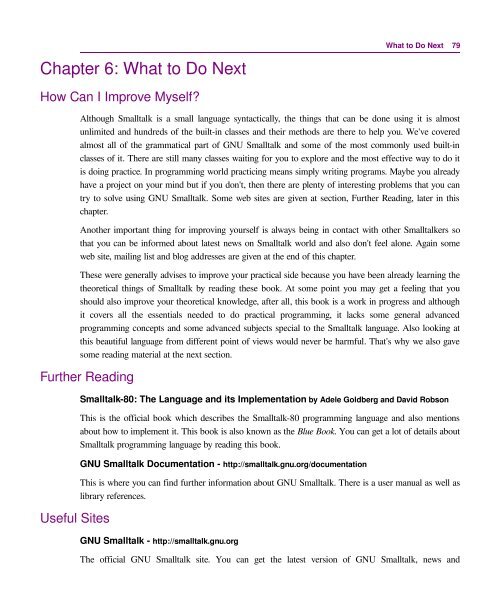Computer Programming with GNU Smalltalk - Free
Computer Programming with GNU Smalltalk - Free
Computer Programming with GNU Smalltalk - Free
You also want an ePaper? Increase the reach of your titles
YUMPU automatically turns print PDFs into web optimized ePapers that Google loves.
Chapter 6: What to Do Next<br />
How Can I Improve Myself?<br />
What to Do Next 79<br />
Although <strong>Smalltalk</strong> is a small language syntactically, the things that can be done using it is almost<br />
unlimited and hundreds of the built-in classes and their methods are there to help you. We've covered<br />
almost all of the grammatical part of <strong>GNU</strong> <strong>Smalltalk</strong> and some of the most commonly used built-in<br />
classes of it. There are still many classes waiting for you to explore and the most effective way to do it<br />
is doing practice. In programming world practicing means simply writing programs. Maybe you already<br />
have a project on your mind but if you don't, then there are plenty of interesting problems that you can<br />
try to solve using <strong>GNU</strong> <strong>Smalltalk</strong>. Some web sites are given at section, Further Reading, later in this<br />
chapter.<br />
Another important thing for improving yourself is always being in contact <strong>with</strong> other <strong>Smalltalk</strong>ers so<br />
that you can be informed about latest news on <strong>Smalltalk</strong> world and also don't feel alone. Again some<br />
web site, mailing list and blog addresses are given at the end of this chapter.<br />
These were generally advises to improve your practical side because you have been already learning the<br />
theoretical things of <strong>Smalltalk</strong> by reading these book. At some point you may get a feeling that you<br />
should also improve your theoretical knowledge, after all, this book is a work in progress and although<br />
it covers all the essentials needed to do practical programming, it lacks some general advanced<br />
programming concepts and some advanced subjects special to the <strong>Smalltalk</strong> language. Also looking at<br />
this beautiful language from different point of views would never be harmful. That's why we also gave<br />
some reading material at the next section.<br />
Further Reading<br />
Useful Sites<br />
<strong>Smalltalk</strong>-80: The Language and its Implementation by Adele Goldberg and David Robson<br />
This is the official book which describes the <strong>Smalltalk</strong>-80 programming language and also mentions<br />
about how to implement it. This book is also known as the Blue Book. You can get a lot of details about<br />
<strong>Smalltalk</strong> programming language by reading this book.<br />
<strong>GNU</strong> <strong>Smalltalk</strong> Documentation - http://smalltalk.gnu.org/documentation<br />
This is where you can find further information about <strong>GNU</strong> <strong>Smalltalk</strong>. There is a user manual as well as<br />
library references.<br />
<strong>GNU</strong> <strong>Smalltalk</strong> - http://smalltalk.gnu.org<br />
The official <strong>GNU</strong> <strong>Smalltalk</strong> site. You can get the latest version of <strong>GNU</strong> <strong>Smalltalk</strong>, news and

















